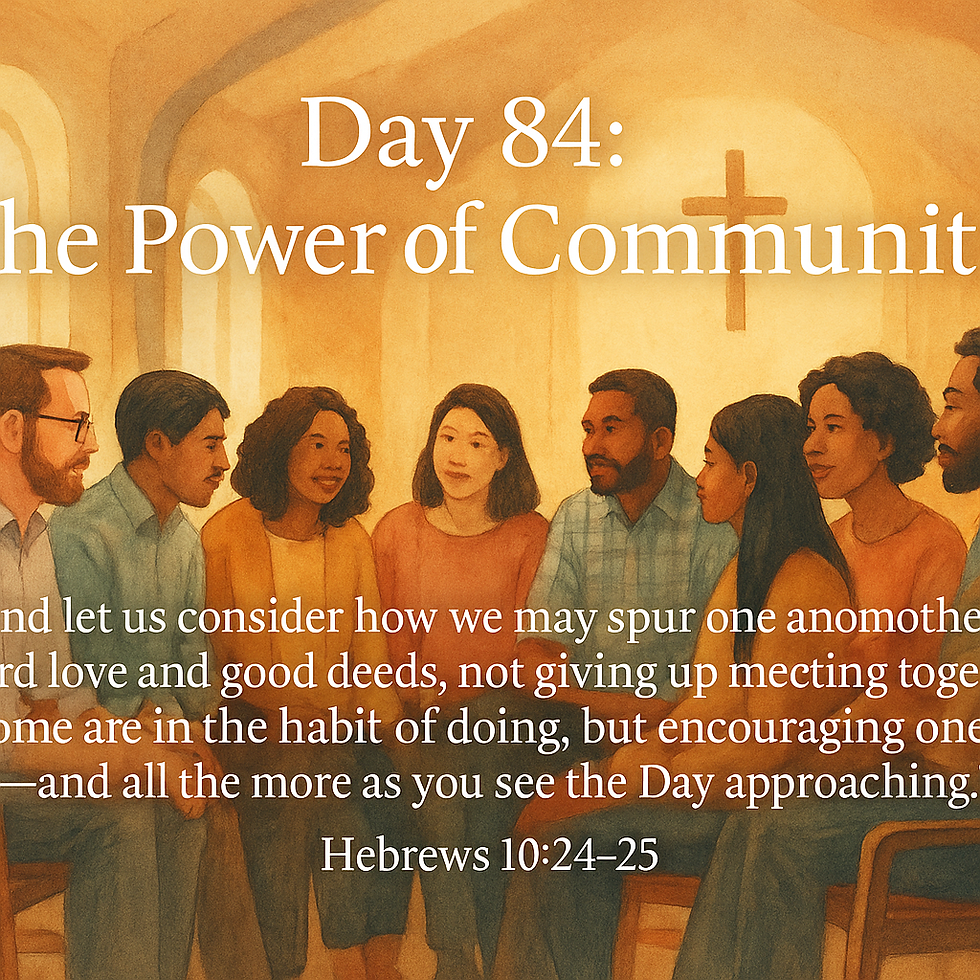The Power of Community
- ironridgeproductio
- Jun 11, 2025
- 4 min read
Scripture: "And let us consider how we may spur one another on toward love and good deeds, not giving up meeting together, as some are in the habit of doing, but encouraging one another—and all the more as you see the Day approaching." - Hebrews 10:24-25

The Christian life was never meant to be lived in isolation. The writer of Hebrews emphasizes that believers need each other for encouragement, accountability, and mutual growth in love and good deeds. This passage reveals that community isn't just beneficial but essential for spiritual health and perseverance.
The phrase "let us consider" suggests intentional thought and planning about how to build others up. Creating meaningful community doesn't happen accidentally but requires deliberate effort to invest in relationships and look for ways to encourage others' spiritual growth.
"Spur one another on" uses imagery from horsemanship where spurs motivate horses to greater effort. In spiritual community, we motivate each other to pursue love and good deeds with greater passion and consistency. This involves both encouragement and gentle challenge.
The focus on "love and good deeds" reveals the practical goals of Christian community. We gather not just for fellowship or emotional support but to help each other grow in Christ-like love and effective service to others. Community has purpose beyond just meeting our own needs.
The warning against "giving up meeting together" acknowledges that gathering with other believers can sometimes feel inconvenient, unnecessary, or disappointing. The writer recognizes that some people were already "in the habit" of neglecting community, but he insists that this practice is spiritually dangerous.
Corporate worship and fellowship serve multiple essential functions that individual spirituality cannot replace. In community, we worship collectively, learn from multiple perspectives, support each other through difficulties, and encourage each other in faith and obedience.
The command to encourage "one another" emphasizes the mutual nature of healthy Christian community. Everyone both gives and receives encouragement based on their gifts, experiences, and current circumstances. Community works best when it's reciprocal rather than one-sided.
"All the more as you see the Day approaching" refers to Christ's return and suggests that community becomes increasingly important as difficulties and challenges intensify. The end times will bring pressures that require mutual support and encouragement to endure faithfully.
Different types of community serve different needs in our spiritual lives. Large gatherings provide corporate worship and teaching, while small groups offer intimacy and accountability. Both formal and informal community relationships contribute to spiritual growth and support.
Authentic community requires vulnerability and transparency as people share their real struggles, questions, and growth areas rather than maintaining perfect facades. This creates environments where genuine help and encouragement can be offered and received.
Conflict resolution skills are essential for healthy community because disagreements and misunderstandings inevitably occur when imperfect people work together. Communities that learn to handle conflicts biblically become stronger and more unified through the process.
Diversity in community reflects the global nature of the church and enriches everyone's experience by providing different perspectives, traditions, and insights. When people from various backgrounds gather in unity, it demonstrates the power of the gospel to overcome human divisions.
Service projects and mission activities strengthen community bonds by giving groups common purposes beyond just meeting together. Working together toward shared goals creates relationships and memories that enhance community spirit and unity.
Digital community has become increasingly important as technology enables connections across geographical distances. Online groups, virtual worship services, and digital communication can supplement but not fully replace face-to-face community interactions.
Leadership in community requires servant hearts that prioritize others' growth and welfare over personal recognition or control. Effective community leaders facilitate rather than dominate, creating environments where everyone can contribute and flourish.
Hospitality is a key component of community building as people open their homes and lives to others, creating spaces for relationships to develop and deepen. Regular hospitality helps transform groups of individuals into genuine communities.
Accountability partnerships within community provide specific support for growth in particular areas such as spiritual disciplines, overcoming sin patterns, or pursuing goals. These focused relationships often produce significant spiritual progress.
Intergenerational community allows different age groups to learn from each other's experiences and perspectives. When older and younger believers interact regularly, both groups benefit from the wisdom and energy that each brings to community life.
Family involvement in community helps children learn social skills, develop friendships, and understand that faith is lived out in relationship with others. Families that prioritize community often have stronger internal relationships as well.
Community care extends beyond emotional support to include practical help during times of need such as illness, unemployment, or family crises. This tangible assistance demonstrates love in action and builds deep bonds of gratitude and commitment.
The healing power of community becomes evident when people find acceptance, support, and restoration after failures or difficult life experiences. Communities that practice grace and forgiveness become places of healing and renewal.
Mission-focused community maintains balance between inward care and outward service, ensuring that groups don't become insular but rather use their strength and unity to serve others and advance God's kingdom.
Today, evaluate your involvement in Christian community and consider how you can both contribute to and benefit from deeper relationships with other believers. Ask God to help you be intentional about building meaningful community.
Prayer: Father, thank You for the gift of Christian community. Help me to be intentional about spurring others on toward love and good deeds while receiving encouragement for my own spiritual journey. Show me how to contribute to authentic community that honors You and builds up others. Give me wisdom to resolve conflicts gracefully and to create environments where everyone can flourish. Use our community to demonstrate Your love to the world. In Jesus' name, Amen.





Comments